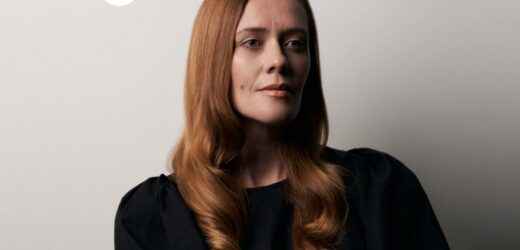Written by Ali Millar
When writer Ali Millar was 28, she walked away from her life as a Jehovah’s Witness, leaving behind her entire family, friends and sense of self. Here, she writes about the journey to rediscovering who she was outside of the“controlling”community she was raised in.
It’s a Friday night in late winter 2008; in the gathering dusk I light a cigarette, wrap my leather jacket tightly around myself to keep out the rain, put my head down and walk fast. I’m late to meet a new friend. I inhale deeply. Breathing has been difficult the last six months. Since I left the religion I was raised in, I’ve been having panic attacks: my breath becomes ragged; I wake in the night with a weight on my chest, my back sweat-soaked. I open a compact mirror and look at the make-up I’d taken care to apply earlier that day, smudging my eyeliner around my eyes before loading them with dark eyeshadow. I am good at this. I have been turning myself into an acceptable fiction for at least half my life. For longer than that – for most of it maybe.
I was 28 years old when I walked home from my final meeting as a Jehovah’s Witness, knowing it would be my last. I opened my wardrobe and stuffed all my meeting and ministry clothes and sensible shoes into a black bin bag that I later heaved into the communal bin outside my flat.
I had been in the religion since I was two years old, when my mother became a baptised member of the church. Raised to believe the end of the world was imminent and everyone not directly associated with the religion would die, we were warned against friendship with ‘worldly’ people outside. Convinced my survival was contingent on it, I adhered to a strict dress code. My skirts all fell below my knee but were not so long that they’d draw unwanted attention to me. My necklines were high, and I didn’t dare show much of my collarbone. I had no concept of who I really was, and the effect this had on me was profound. As I entered my teen years, I became increasingly anxious, drinking drink too much and eating too little.
Later, when I began to doubt the religion in my late 20s, my modest clothes were the first façade to fall. My hemlines rose and my necklines fell, exposing both my collarbones and ankles, before the final taboo – my knees – were on display. At first, I received concerned glances from the elders’ wives, then counsel from their husbands. As my outsides began to betray what was happening inside, the internal transformation I’d desperately tried to keep from everyone, but mainly from myself, became increasingly evident. I had become a problem.
After facing a judicial committee, which is the religion’s internal disciplinary procedure in which three elders made me confess my sins to them before deciding I was still allowed to remain part of the religion, I was increasingly ostracised by members of the congregation. It culminated one day when I was told by an elder that I’d never have God’s favour. I realised then there was no point in trying; that was my last day in the community, and it led to me losing everyone I’d ever known up until that point. It’s a loss that’s difficult to explain; I don’t have old friends or people I share childhood memories with. There’s a clear dividing line between then and now. When I left, I wasn’t sure I was strong enough to handle such a huge loss. It’s still not easy, but I have to balance it with what I’ve gained, and my freedom means more to me.
That day in 2008, I knew I needed to build a new life, but exactly how I’d do that felt unclear. After years of believing everyone outside were sinners about to be destroyed, I was terrified. Lost, I needed a way to anchor myself. I knew on some level that entering into the next world was contingent on what I looked like, and after so long spent focusing on fitting into a group, it was inevitable that I equated acceptance with appearance. I didn’t realise then the mistake I was making. Over the coming months I swapped one form of devotion for another – this time I knelt at the temples of capitalism, filling my wardrobe with clothes that made me look like people outside. I bought ripped jeans, a studded leather jacket, dyed my hair black and had a fringe cut in. It doesn’t sound like much, but it was everything that had been frowned upon. I was becoming something I’d never been allowed to be. But as time passed, I realised I didn’t feel right. I was simply playing dress-up. I was still hollow.
As summer turned to autumn, I spent Sunday mornings walking to the cinema instead of the Kingdom Hall, the Witness meeting place. I’d sit in the dark watching films, no longer having to care if they had swearing, sex or violence in them. On the way home I’d visit secondhand bookshops, no longer worrying if the books had something taboo in them. I began to actively welcome things previously forbidden. I started going to gigs, standing at first at the side, and then slowly making friends. I visited galleries and exhibitions, having this strong sense that art at least could save me when God couldn’t. But compared to my new friends, who had such a strong identity and purpose, I felt like I was a year old, just at the start of discovering who I was. The more I tried to throw myself into the world around me, the more alienated I felt.
This feeling of being half-formed followed me around; I needed to do something about it. As a Witness I’d always been evangelical about books, distributing literature at the weekends, and this fervour hadn’t abated on leaving. Maybe, I began to think, this is where my salvation had been waiting all along. And so, I applied to study creative writing in the hope that if I was forfeiting my eternal life, then at least I could make it worth it. I would use it to put an end to this purgatory.
The following August and Edinburgh was in the grip of a heatwave. The university’s long sash and case windows were open with students excitedly grouped together talking about plots and arcs. For a second, I wondered why they were talking about Noah’s flood, a story I’d been told countless times. Still, my language was too limited. Literature was still not enough to bridge the past with the present. For the rest of the year, I read my way towards writing, encountering literary theorists for the first time and reading novels previously forbidden. This, I realised, is what freedom looks like – and it has nothing to do with appearance. I could almost sense my mind waking up, stretching, learning how to ask questions and not just accept what it had been told.
But at times, I still felt stuck. I realised there was a difference between leaving a thing and it leaving me. Bored of feeling like this, I began to write the past down in the hope it would help me move forward. It wasn’t at any stage a cathartic process; it was mostly living in a daily hell of my own remembering. For months on end, I walked around things I’d rather forget. I listened to songs I’ve been too scared to return to – the wrong bassline constricting my chest, but they opened up my memory, situating me right back into scenes I didn’t want to see.
I would often vomit after I wrote; I would have panic attacks, and eating became more difficult. I showered so often I was almost amphibian. I felt as if I’d sandpapered my own skin off. It was not a comfortable way to feel. To write about the environment I grew up in convincingly meant I had to place myself right back into the very memories I was trying to suppress. Saying it was traumatic doesn’t quite cover it. But, as I wrote what became my recently published memoir, The Last Days, I was forced to look at the past in a different way. What I’d previously blamed myself for, I now realised wasn’t my fault. I began to see that I’d had my whole identity manipulated and controlled from two years of age. Of course I didn’t know who I was when I left – how could I when all I’d done was conform to the expectations of the religion? It was an epiphany I wouldn’t have arrived at without writing, and it’s this that has allowed me to finally embrace who I am.
Before then, I was suspended between the past and future, whereas now I can finally fully inhabit the present tense. It has become the thread needed to connect what happened to me with who I am now. Through writing it, I learned to no longer be ashamed of how I’d been raised or of the cultural gaps I still have; I can now inhabit myself and the world I find myself in fully. No longer ashamed of who I was, I’m proud of who I’ve become. Today, I wouldn’t swap my identity for anything.
The Last Days: A Memoir of Faith, Desire and Freedom by Ali Millar (Ebury, £16.99) is out now.
Source: Read Full Article




